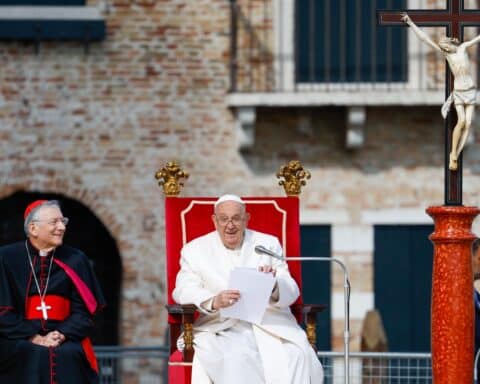“To promote theology in the future, we cannot limit ourselves abstractly to reproposing formulas and schemes from the past,” begins Pope Francis’s new instruction on the nature of theology, Ad Theologiam Promovendam. Theology must “prophetically interpret the present” and “see new itineraries for the future,” he continues. It must “deal with profound cultural transformations.” Theology must engage with other disciplines, the pope suggests; it must have a “relational dimension … inserted in a web of relationships.” Theological reflection must be “transdisciplinary” so it is able to “communicate the truths of the faith and transmit the teaching of Jesus … with originality and critical awareness.”
At face value, nothing is problematic about these admonitions. In fact, theological reflection must always converse with various aspects of human experience. Dialogue aims to sharpen the Church’s articulation of the truth of revelation and address the challenges of new cultural phenomena.
The problem with Ad Theologiam Promovendam is that the admonition to be attuned to cultural contingencies takes the form of a contentious judgment about the past. It fails to appreciate — or even acknowledge — that theologians and popes have been engaged in precisely this endeavor throughout the history of the Church. More problematic still, the framing of the document suggests an agenda for the future that threatens the integrity of the Church’s witness to the Gospel.
Two thousand years of bad theology?
The document bears the unfortunate implication that Catholic theology has been 2,000 years of nothing other than stale repetition of benighted dogmas. Ad Theologiam Promovendam suggests that, until very recently, the Church has failed to engage the world. So we have to ask whether or not it’s true that the Church has practiced a “self-referential” theology in “isolation” and, therefore, is “insignificant.”
Among other problems, this charge impugns the enormous theological contributions of Pope Francis’s two immediate predecessors. Pope St. John Paul II and Pope Benedict XVI advanced the Church’s understanding of the truth of revelation while constantly — constantly — engaging the signs of the times. They have left a legacy of vibrant engagement with current trends in philosophy, politics, economics and broader cultural trends.
These popes, and numerous other predecessors, have been vigorously practicing what Ad Theologiam Promovendam implies has been absent from the Church. They have read the signs of the times through the lens of faith, developing our understanding of the Faith accordingly. The difference with Pope Francis, however, is that he wants to read the Faith in light of the signs of the times. And he seems to think the Faith must bend toward the arc of the times.
Interpret the times … or surrender to them?
For the new document, rather than test “cultural phenomena” against the standard of faith, these phenomena become the standard the Faith must conform to. But this is the opposite of “prophetically interpreting” the present times. It is, rather, subserviently surrendering to them. For example, the document calls for a “paradigm shift” that commits theological reflection “to being a fundamentally contextual theology.” But rather than interpret contexts by the Gospel, he wants the Church to “read and interpret the Gospel in the conditions in which men and women live daily.” But this turns the theological task directly on its head.
Theology should be — and in its best form always has been — contextual.
The theologian and the prelate must take account of historical, cultural, political and economic developments. The Church must be attuned to and conversant with contemporary contingencies. As the great Swiss Reformed theologian Karl Barth famously said, the preacher must take the newspaper in one hand and the Bible in the other. But he does this for the purpose of reading the former through the truthful lens of the latter. Ad Theologiam Promovendam suggests precisely the opposite: interpreting the Bible by the contingencies of cultural shifting sands.
In 1990, the Congregation for the Doctrine of the Faith (CDF) promulgated Donum Veritatis, or “On the Ecclesial Vocation of the Theologian,” which suggests a richer approach to the issue Ad Theologiam Promovendam presents. “Theology has importance for the Church in every age so that it can respond to the plan of God ‘who desires all men to be saved and to come to the knowledge of the truth’ (1 Tm 2:4),” according to Donum Veritatis. “In times of great spiritual and cultural change, theology is all the more important,” it continues. But while theology must take account of these changes, the theological agenda is not driven by them. Rather, the Church “must strive to ‘abide’ in the truth (Jn 8:31) while at the same time taking into account the new problems which confront the human spirit.” The truth “possesses in itself a unifying force,” providing a fixed standard by which the shifting cultural trends are to be addressed and judged.
Donum Veritatis explains that the theologian must “draw from surrounding culture those elements which will allow him to better illuminate one or another aspect of the mysteries of faith.” But in contrast to Ad Theologiam Promovendam, Donum Veritatis insists that the “ultimate normative principle for such discernment is revealed doctrine which itself must furnish the criteria for the evaluation of these elements … and not vice versa.”
In contrast to this ordering of revealed truth and cultural contingencies, Ad Theologiam Promovendam suggests that truth is found in whatever contemporary trends prevail and that the Church’s theology must conform to it. The document suggests that time “imposes on theology” and theology must yield. Thus, it continues, “It is necessary to give priority to the knowledge of the common sense of the people.” To this interpretation, I respond as Karl Barth emphatically declared to his Swiss contemporary Emil Brunner’s suggestion for a natural theology: Nein! Emphatically, unequivocally, No!
Alarming results
It’s not surprising that Ad Theologiam Promovendam echoes some of the same problematic themes and assumptions that appear in the synthesis report from the recently completed session of the Synod on Synodality. Both documents labor under the assumption that history produces (not reveals — produces) immutable truths to which mutable theological reflection must conform. More dangerously, both seem to think that theology must find a language to justify or underwrite these allegedly immutable historical advancements.
Take, for example, the tendentious assertion of the synthesis report — rattled off as though it were practically self-evident — that “the anthropological categories [the Church has] developed are not able to grasp the complexity of the elements emerging from experience or knowledge in the sciences.” Specifically related to “identity and sexuality,” the synthesis report implies that highly political theories of sexuality and gender identity are to be received as true anthropological developments to which the Church’s theology must find a language by which to acquiesce.
Note that I said “political” theories of sexuality, not scientific ones. These theories are not rooted in science. Rather, they are the politically motivated denial of basic physiological and biological science. And the purpose for which they are advanced is contrary to the witness and mission of the Church. The synthesis report is not a call to reach into the Church’s rich treasury of theological anthropology to challenge these false anthropologies. Rather, it seems to want to “translat[e] them into pastoral practice.”
The synthesis is written as though the rich and deep reflection on sexual anthropology of, for example, Pope St. John Paul II, never occurred. Instead, it seems to imply that everything the Church can learn about sexuality comes from the historical advancement of (what it seems to assume is) science.
Now, don’t get me wrong. We most certainly need to apply the Church’s doctrine to the pastoral care of persons with gender dysphoria. But this is a completely different matter from assuming that the secular theories of gender ideology are the received truth to which the Church’s theology must adapt. Calls for accompaniment, sensitivity, compassion and pastoral nuance are well-taken. But the synthesis seems to imply that all of these are at the service of whatever sexual anthropology history “reveals.” This substantive conclusion is the practical, and inevitable, result of the methodological assumptions of Ad Theologiam Promovendam. In other words, my unease with the latter document is not simply theoretical. The practical result of its highly problematic method is to subsume the Church’s timeless understanding of the human person under the gender theory flavor of the month.
As noted above, this gets the relationship between theological consideration and historical development exactly backward. Theological reflection must prioritize the ancient deposit of faith against which the people’s common sense is to be admonished, encouraged, and — if necessary — judged. “It does this … by contemplating ever more deeply … the contents of the faith itself,” explains Donum Veritatis, “and by dutifully presenting the reasonableness of the faith to those who ask for an account of it” (emphasis added). The “Spirit of truth,” rather than the spirit of the times, is the standard of that account.
Abiding in the truth
The theological task must always be attuned to contemporary intellectual and cultural developments. A theology that is not engaged with the world or that is not open to utilizing tools of other disciplines is a theology that will die. For that reason, explains Donum Veritatis, theology is “exposed to risks since it must strive to ‘abide’ in the truth (cf. Jn 8:31) while at the same time taking into account the new problems which confront the human spirit.” The risk that cultural engagement is for the corruption of doctrine rather than its development. Without considering this, Ad Theologiam Promovendam exposes the Church to the former rather than contributes to the latter.
“To live is to change,” St. John Henry Newman famously declared, “and to be perfect is to have changed often.” If the message of the Gospel is to have perennial relevance, its articulation must always develop. However, the relevance of the Church’s teaching is not sustained when that teaching merely endorses the latest historical trends and cultural phenomena. Rather, its relevance is in making judgments about the relative truth or falsehood of those contingencies, as measured by the rule of faith.
“You are the salt of the earth,” said Jesus to his disciples. “But if salt loses its taste … it is no longer good for anything but to be thrown out and trampled underfoot” (Mt 5:13). The “paradigm shift” of Ad Theologiam Promovendam would yield a “gospel” of tasteless salt, indistinguishable from the food it is meant to season. In its quest to be relevant for all, it would become relevant to none.





